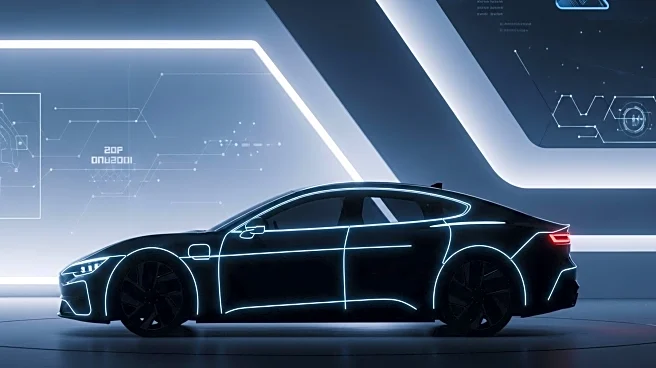What's Happening?
Toyota is expected to unveil a concept Corolla EV at the upcoming Japanese Mobility Show in Tokyo. The current Corolla model, which debuted in 2020, is due for a next-generation update in 2027. The concept car features a futuristic design with a light bar across the front end, sharp LED headlights, and a charging port on the front left fender. While Toyota has not released specific details, the concept may indicate a shift towards offering hybrid, plug-in hybrid, and battery electric versions of the Corolla. Toyota executives in the US anticipate slow but steady growth in EV sales, suggesting a cautious approach to expanding their electric vehicle lineup.
Why It's Important?
The potential introduction of a Corolla EV reflects Toyota's strategic response to evolving consumer preferences and regulatory pressures for cleaner transportation options. As one of the world's best-selling car models, the Corolla's transition to electric could significantly impact global EV adoption rates. Toyota's approach to offering multiple powertrain options may cater to diverse market needs, balancing innovation with consumer demand. The unveiling at the Japanese Mobility Show highlights the importance of international auto shows in shaping industry trends and consumer expectations.
What's Next?
Toyota's presentation at the Japanese Mobility Show on October 29 will provide further insights into the company's EV strategy and design philosophy. The concept's reception may influence Toyota's decision to expand its electric vehicle offerings in key markets, including the US. As the automotive industry navigates shifting tariffs and regulatory landscapes, Toyota's strategic planning will be crucial in determining the Corolla EV's market positioning and production timeline.
Beyond the Headlines
The Corolla EV concept underscores the broader industry trend towards electrification and the challenges automakers face in balancing innovation with consumer demand. Toyota's cautious approach reflects the complexities of transitioning established models to electric powertrains without alienating existing customers. The concept's design elements may influence future automotive aesthetics, emphasizing the integration of advanced technology with traditional vehicle features.








